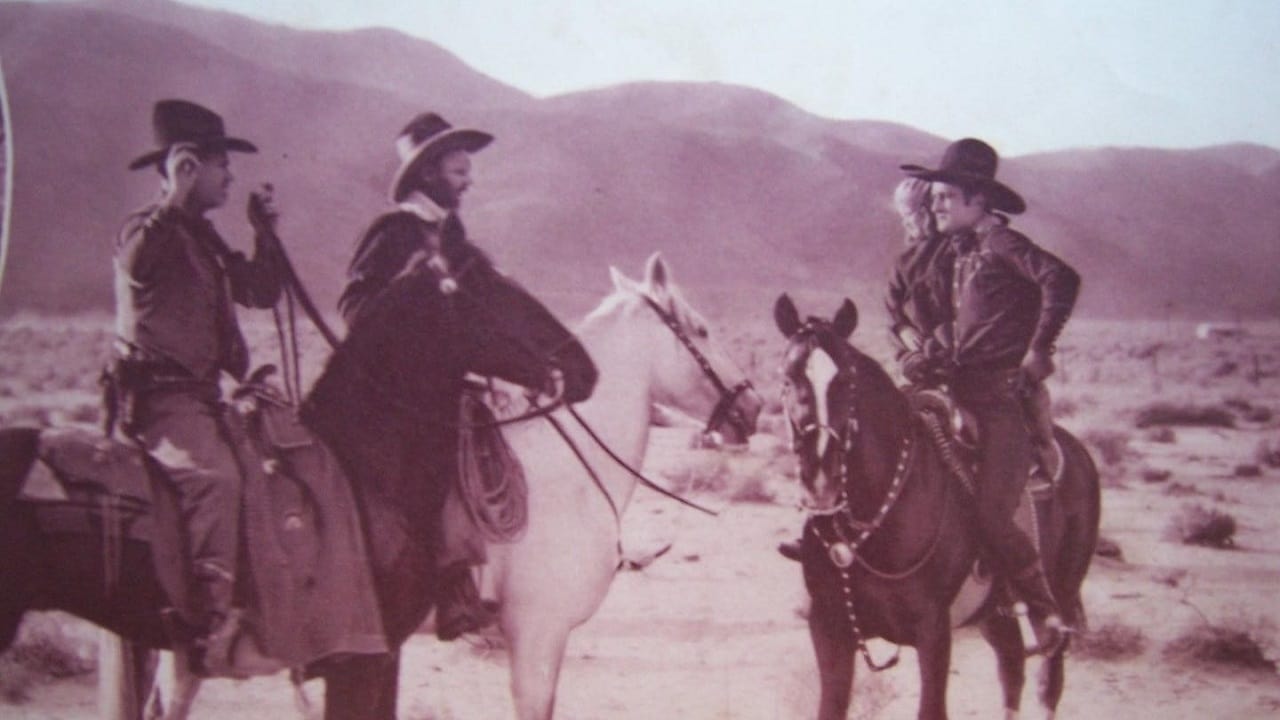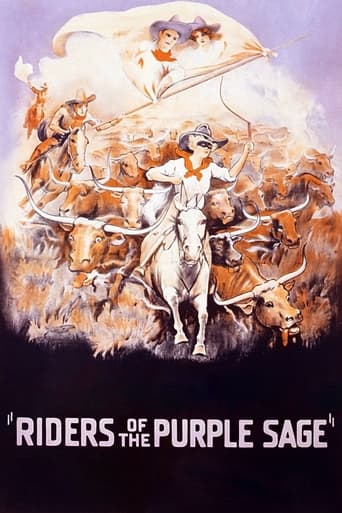

I was totally surprised at how great this film.You could feel your paranoia rise as the film went on and as you gradually learned the details of the real situation.
... View MoreGood films always raise compelling questions, whether the format is fiction or documentary fact.
... View MoreThis is a must-see and one of the best documentaries - and films - of this year.
... View MoreClose shines in drama with strong language, adult themes.
... View MoreThis version of Zane Grey's "Riders of the Purple Sage" is arguably the best of several filmed versions. It stars the legendary Tom Mix in a tale of tragedy and revenge.Frank Erne (Arthur Morrison), his wife Milly (Beatrice Burnham and their young daughter Bess are trying to carve out a life for themselves on a seedy ranch in the middle of nowhere. Oily lawyer Lew Walters (a slim and trim Warner Oland) has designs on Millie and tries to get her to run off with him. She refuses. Walters and three cohorts kidnap Millie and her young daughter and mortally wound Frank. Before he dies, Frank sends for Millie's brother Jim Carson (Mix). Carson vows revenge on the kidnappers even if it takes a lifetime.Believing her husband dead, she is forced to marry Walters. But Walters has little patience with young Bess. He forces Oldring (Wilfred Lucas), the leader of a gang of rustlers known as (wait for it), The Riders of the Purple Sage, to abduct Bess. Milly exhausts herself trying to find her daughter and dies.Fast forward twenty years and Carson has (for some unknown reason) changed his name to Lassiter and become a notorious gunfighter. Walters meanwhile has moved to the town of Cottonwood and has been "appointed" as Judge Dyer under town boss Tull (Charles Lemoyne). Lassiter catches up to Walters three henchmen and guns them down in a saloon fight.Still searching for Walters, Lassiter comes upon a ranch owned by Jane Withersteen (Mabel Balin) where one of her ranch hands, Venters (Harold Goodwin) is about to be bull whipped by Tull and his men. Lassister intervenes and the two become friends. Lassiter hires on as June's foreman.Venters comes across Oldring and his riders that include a mystery masked rider whom he shoots when the gang attacks. The masked rider turns out to be Lassiter's long lost niece Bess (Marion Nixon) whom Venters nurses back to health on an isolated mountain top hideaway. Lassiter learns of Judge Dyer's true identity and guns him down in a court room shoot out.Tull forms a posse and hunts Lassiter. Lassiter, Jane and her adopted daughter Fay (Anne Shirley) decide to flee from the gang. They meet up with Venters and Bess and Lassiter learns of her true identity. Then as Tull and his posse close in......................................This film crams a lot of plot and action into its scant 56 minute running time. It has beautiful scenery, plenty of action and a top notch performance by Tom Mix who at this time was at the top of his game. Warner Oland would achieve lasting fame as Charlie Chan in the 1930s.One can see why Tom Mix was as popular as he was. He was a great performer. A highlight in this film, was Tom hiding from the bad guys and riding upon a piece of brush tied to his horse Tony to escape. There was always a spectacular stunt or two in most Mix pictures.
... View MoreTHE RIDERS OF THE PURPLE SAGE (Fox, 1925), directed by Lynn Reynolds, stars Tom Mix, popular cowboy hero of the silent screen, in the second of four filmed adaptations based on Zane Grey's classic western novel, and the best known of them all, mainly due to its interesting story, good scenery, a touch of comedy, plenty of action and fine performances provided by its leading actors, especially Tom Mix as a fearful cowboy who is quick on the trigger.Opening with the inter-titles reading: "On the far reaches of the great southwest in the late eighties, Frank Erne and his wife are making a brave fight to establish their little homestead," the story gets underway with Millye Erne (Beatrice Burnham) mother to her infant daughter, Bessie (Sissyl Johnson) and husband, Frank (Arthur Morrison) who is heavily in debt, tired of her struggling existence. She is loved by Lew Walters (Warner Oland), a local attorney, who, after being forced to leave town, decides to take Millye with him. When she refuses, he takes her by force, having his men (Fred Kohler, Jim Ritzson and Charles Newton) abducting her child and shooting Frank. Before he dies, Frank tells the situation to Jim Carson (Tom Mix), a Texas Ranger and Millye's brother, leading him to carry on a new mission, dedicating his life in locating his sister and niece as well as tracking down Walters. Walters marries Millye after learning of Frank's death. Feeling the child to be a nuisance and wanting Millye all to herself, although she really doesn't love him, Walters, now under the assumed surname of Pyer, hires Oldring (Wilfred Lucas), leader of the Riders of the Purple Sage, to take the child away. At a loss for her Bessie, Millye searches aimlessly in the wilderness for her, and dies in the process. During his years of searching, Carson, now going under the name of Jim Lassiter, learns of his sister's fate through Jane Witherstein (Mabel Ballin), who had found and befriended her prior to her death. Because Jane knows the whole story but at present refuses to tell how much she knows, Carson, accepts the job as foreman on her ranch, and bonds with Fay Larkin (Dawn O'Day, later to become teen actress Anne Shirley in the 1930s), an orphaned child Jane has adopted. As Jim saves Jane from the clutches of Richard Tull (Charles Lamorne), a ruthless cattleman, Bern Venters (Harold Goodwin), a young cowboy, encounters a masked member of the Riders of the Purple Sage, a young girl (Marian Nixon) who might possibly be Jim's missing niece.A simple story and an above average western motion picture, RIDERS OF THE PURPLE SAGE which runs under an hour, moves swiftly across the screen. Aside from an earlier 1918 version with William Farnum, and its 1931 and 1941 remakes, starring George O'Brien and later George Montgomery, a sequel, THE RAINBOW TRAIL (Fox, 1925) also featuring Tom Mix, immediately followed.Fans of the "Charlie Chan" movie series from the 1930s will take pleasure in watching Warner Oland some years before playing the Oriental sleuth taking part as a nasty villain here. Aside from assuming two identities to his sole character in RIDERS OF THE PURPLE SAGE, take notice that Oland's appearance changes three times during the coarse of the story. He is introduced sporting dark hair and mustache. In the middle portion of the story, he appears a trifle older minus the mustache, and for the near conclusion, which is set some 15 years or so later, now acting as judge in a town of Cottonwood, his hair has changed to white sporting once again a mustache. Regardless of how he appears, this is the man the Texas Ranger, as played by Mix, wants to get.Of the handful of Tom Mix westerns released during the silent era, many have survived but few have been revived. THE RIDERS OF THE PURPLE SAGE did become one of the few to be presented on television, notably on public television 13-week series of THE SILENT YEARS (1975), as hosted by Lillian Gish, accompanied by an excellent piano score by William Perry from the Paul Killiam Collection. In later years, it was distributed on video cassette in 1996 by Critic's Choice video and sometime later on DVD. Rarely shown on television these days, it can be found on one of the numerous cable stations, The Westerns Channel, showing the movie with the Perry piano score. Fine viewing for silent western fans and a fine introduction to movie cowboy Tom Mix. (***)
... View MoreThis is the old story, familiar to everyone who has seen more than three westerns. What is remarkable about this movie is the contrasts in beauty: superb scenes of nature fill the screen: towering mountains, cattle moving slowly over the sprawling prairies, high waterfalls filling the vistas shot outdoors. In contrast, the shots of 'civilization' are full of ugliness: broken palings of forts, ramshackle sheds that should fall down and disappear and cluttered interior shots. Even the heroine's home is made only half-decent by the plants that she has growing everywhere.This contrast, between the beauty of nature and the ugliness of the works of man appears throughout the movie and makes the ending -- where Tom Mix pushes over a boulder that will simultaneously make it impossible for the bad men who are pursuing him, his heroine and Anne Shirley -- a child actor at this stage, appearing under the name of "Dawn O'Day" -- and seals them forever in a valley far from the works of man -- not only understandable, but inevitable. It's a silent movie and it works as a silent movie, where all you have are the images. Highly recommended, both as an introduction to Tom Mix and on its own merits.
... View More